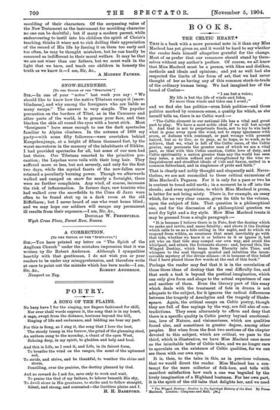rro THE EDITOR Or THE " SPECTATOR:1 SIR,—In one of
your " notes " last week you say : "We should like to know how the native Tibetans escape it [snow. blindness], and why among the foreigners who are liable so many escape." The answer is very simple. The popular precaution on the borders of Tibet, as in the Caucasus and other parts of the world, is to grease your face, and then blacken the skin all round the eyes with a burnt stick. Most "foreigners" have sense enough to use the dark spectacles familiar to Alpine climbers. In the autumn of 1899 my party—with some fifty followers—were overtaken behind Ka.ngchenjunga, at a height of fifteen thousand feet, by the worst snowstorm in the memory of the inhabitants of Sikkim. I had provided spectacles for all, but some of our men had lost theirs. Our Tibetans resorted to the primitive pie- caution; the Lepchas wove veils with their long hair. They suffered more or less, but not severely, and only for the first two days, while the myriad facets of the new-fallen snow retained a peculiarly burning power. Though we afterwards walked and camped on snow for nearly a fortnight, there were no further complaints. Any wind, of course, increases the risk of inflammation. In former days, raw tourists who had walked over the snowfields to the Cima di Jazz' were often to be found shut up in a dark room at the old Riffelhaus ; but I never heard of one who went home blind ; and we may hope our soldiers will escape any permanent ill results from their exposure.—I am, Sir, &c.,
DOUGLAS W. FRESHFIELD.


























































 Previous page
Previous page